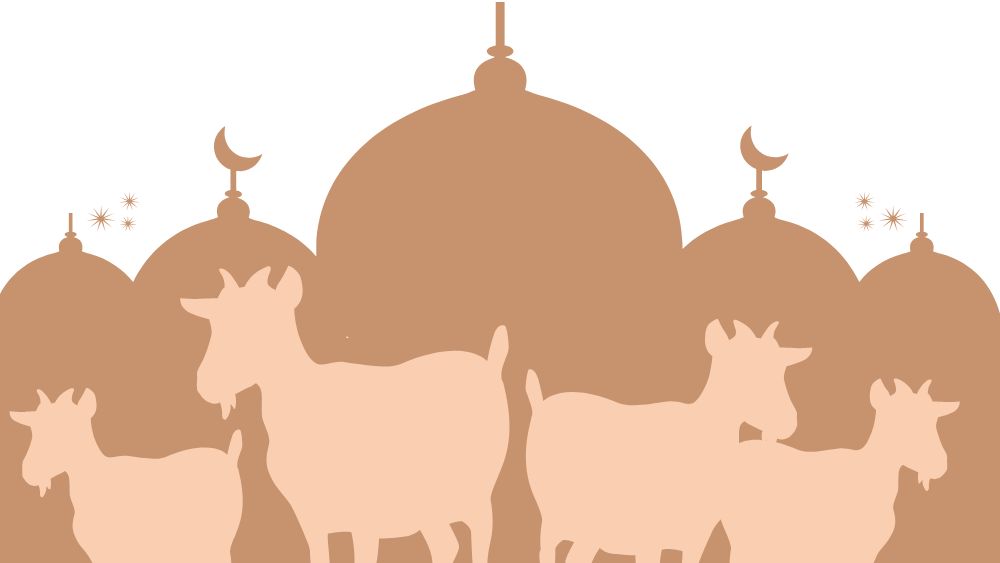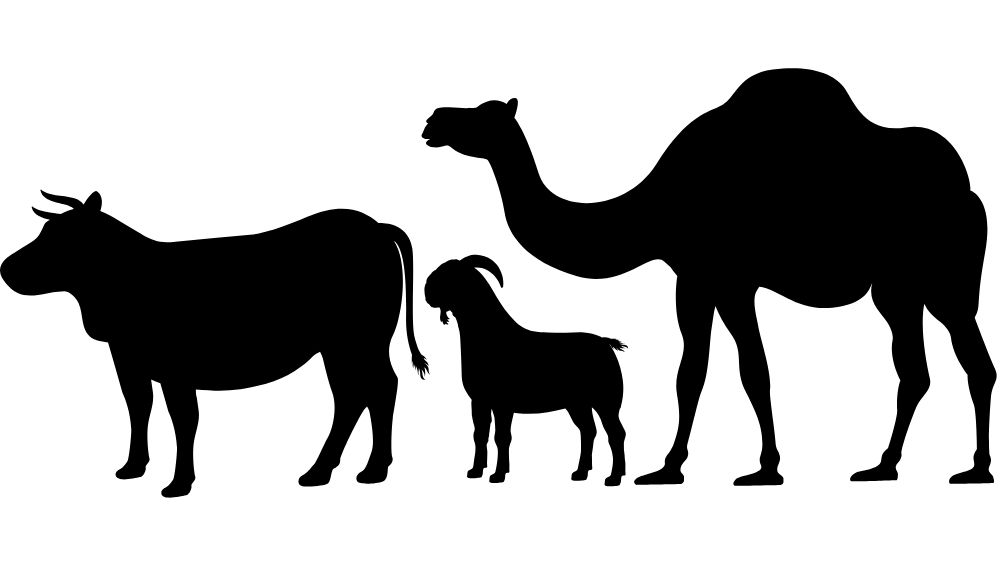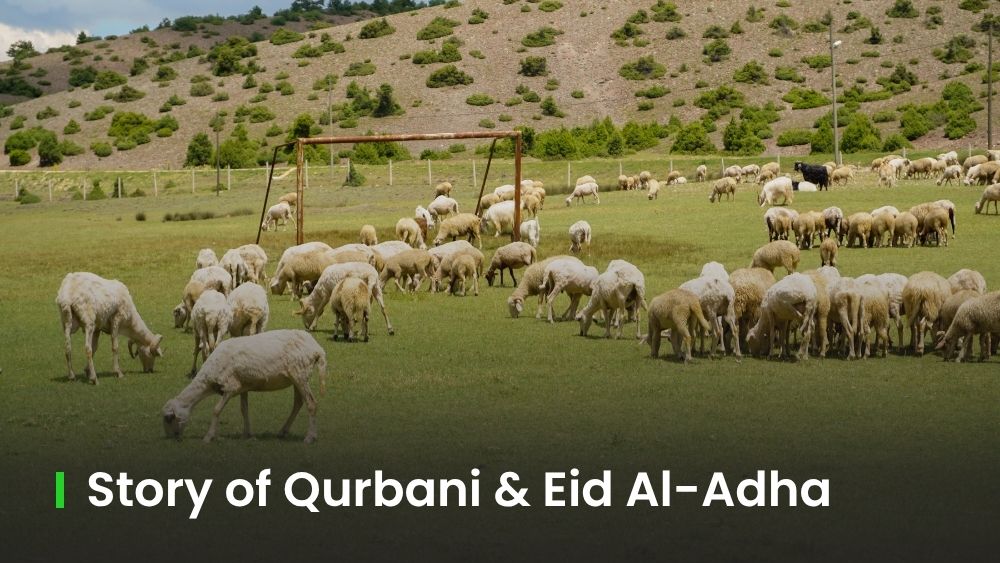Ever wondered about the real history of Qurbani? Most of us connect it with Prophet Ibrahim’s (AS) Qurbani, but the story actually goes back even further, to the two sons of Prophet Adam (AS). And here’s something surprising: did you know that Prophet Muhammad’s ﷺ father, Abdullah, was also nearly sacrificed?
In this blog, we’ll explore the history of Eid al-Adha and Qurbani in Islam — from Habil and Qabil, to the legendary sacrifice of Prophet Ibrahim (AS) and Ismail (AS), and finally, how Qurbani became a Sunnah of the Prophet ﷺ.
The First Known Sacrifice of the Two Sons of Prophet Adam (AS)
The earliest mention of sacrifice in Islam is found in the story of the two sons of Adam (AS), Habil and Qabil. A conflict arose between them due to a disagreement related to marriage. To resolve it, Prophet Adam (AS) told them to sacrifice. Whichever sacrifice Allah accepted would be considered the correct one.
Habil sacrificed an animal (ram), while Qabil offered crops he had grown. Habil chose a healthy one of his best animals, whereas Qabil didn’t give the best crops he produced. Allah was pleased with Habil’s intention and accepted his sacrifice. On the other hand, Qabil’s sacrifice was rejected. This made Qabil jealous, and he eventually killed his brother Habil.
Allah Subhanahu Wa’Tala tells the story in the Quran,
“Recite to them in all truth the story of Adam’s two sons: How each offered a sacrifice, and how the offering of one was accepted while that of the other was not. The latter said: “I will kill you.” The former replied: “Allah only accepts the sacrifice from the righteous.” [Sura Al-Maida, 5: 27]
Habil sacrificed with the sincere intention that Allah (SWT) wants from us. It comes from the Taqwa (Allah’s fear).
Learn more from this detailed article.

Prophet Ibrahim (AS) and Ismail (AS) Pass the Ultimate Test
Prophet Ibrahim (AS) faced many trials from Allah throughout his life — from being thrown into fire, to leaving his family in the desert — and he passed each one with unwavering faith.
One of the greatest tests came in his old age, after years of longing for a child. His wife Sarah (AS) offered her servant Hajar (AS) in marriage, and through her, Allah blessed him with his first son, Ismail (AS).
Later, when Ismail (AS) became a young boy, Ibrahim (AS) saw in a dream that Allah commanded him to sacrifice his beloved son. Recognising this as a command from Allah, he told Ismail (AS), who replied:
“O my father! Do as you are commanded. If Allah wills, you shall find me of the patient.” [Surah As-Saffat, 37:102]
According to narrations in Tabari and Hakim, Shaytan tried to convince Ibrahim (AS), Hajar (AS), and Ismail (AS) separately that the command was wrong, and each of them threw stones at him.
Despite the emotional pain, Ibrahim (AS) laid Ismail (AS) down and covered his eyes to carry out Allah’s command. Ibn Kathir mentions that the knife passed over Ismail’s neck but did not cut.
Then came Allah’s call: “O Ibrahim! You have already fulfilled the dream.” [Surah As-Saffat, 37:104–105]
Allah sent a white-horned ram from Jannah to be sacrificed instead. This moment of full submission by both father and son became the foundation of Qurbani, teaching us that the true essence of sacrifice is sincere devotion to Allah.
Check out this article to learn more about this story.
The Sacrifice Story of the Prophet’s ﷺ Father Abdullah
While the story of Prophet Ibrahim (AS) and his son Ismail (AS) is well-known, there’s another significant story in the history of Qurbani, and it’s much closer to the life of our beloved Prophet ﷺ.
Abdullah, the father of Prophet Muhammad ﷺ, was once chosen to be sacrificed by his father Abdul Muttalib. This came after Abdul Muttalib made a vow to Allah that if he were granted ten sons, he would sacrifice one of them for His sake.
When the time came, the lot fell on Abdullah, and Abdul Muttalib prepared to fulfill his promise. But after much consultation and divine signs, Abdullah’s life was spared by offering one hundred camels in his place.
This extraordinary incident not only shows the spirit of sincerity in pre-Islamic vows but also laid the groundwork for blood money (Diyah) in Islamic law. Because 100 camels were slaughtered to ransom Abdullah from being slaughtered which is still the blood money in Islam today. Prophet ﷺ referred to himself as Ibn al-Dhabihayn – “the son of the two sacrificed ones,” referring to both Ismail (AS) and Abdullah.
This moment highlights that the legacy of Qurbani runs deep in the Prophet’s ﷺ lineage, connecting us back to a profound chain of submission and sacrifice.

The Prophetic ﷺ Qurbani
Our beloved Prophet Muhammad ﷺ revived the Sunnah of Prophet Ibrahim (AS) by offering Qurbani and instructed us to do the same. Every year, the Prophet ﷺ performed Qurbani, establishing a practice that Muslims around the world continue to follow to this day.
The Messenger of Allah ﷺ would seek out rams that resembled those sacrificed by Habil and Ibrahim (AS): white rams with horns to offer as Qurbani on Eid al-Adha. [Musnad Ahmad]
Anas (R) narrated: “The Prophet ﷺ slaughtered seven Budn (camels) while standing, with his own hands. On the day of `Id-ul-Adha he slaughtered (sacrificed) two horned rams, black and white in colour.” [Sahih al-Bukhari : 1712]
Every year, the Prophet ﷺ offered two Qurbanis: one on behalf of himself and his family, and the other on behalf of his Ummah, specifically for those who were unable to perform the sacrifice themselves.
“The Prophet ﷺ sacrificed for the one who could not sacrifice from his ummah, one who bore witness to the Oneness of Allah and [his] Prophethood.” [Tabarani, Musnad Ahmad]
Anas bin Malik (R) said: “The Prophet ﷺ used to sacrifice two rams, and I also sacrifice two rams.” [Sahih Bukhari: 5553]
So, if Allah has blessed you with wealth, consider offering more than one Qurbani. This not only helps more families benefit but also revives a noble Sunnah. And by doing so, you earn extra reward from Allah (SWT), inshaAllah.
Conclusion
The history of Qurbani isn’t just about rituals, it’s a story that spans generations, from the time of Adam (AS) to the family of our beloved Prophet ﷺ. Each chapter, from Habil and Qabil to Ibrahim (AS) and Ismail (AS), and even the lesser-known story of Abdullah, reveals how sacrifice has always been an integral part of our Deen..
As the Qurbani approaches, take a moment to remember where this tradition began and what legacy it leaves behind. One that connects us to the past and reminds us what it truly means to give for the sake of Allah.

Leave a Reply